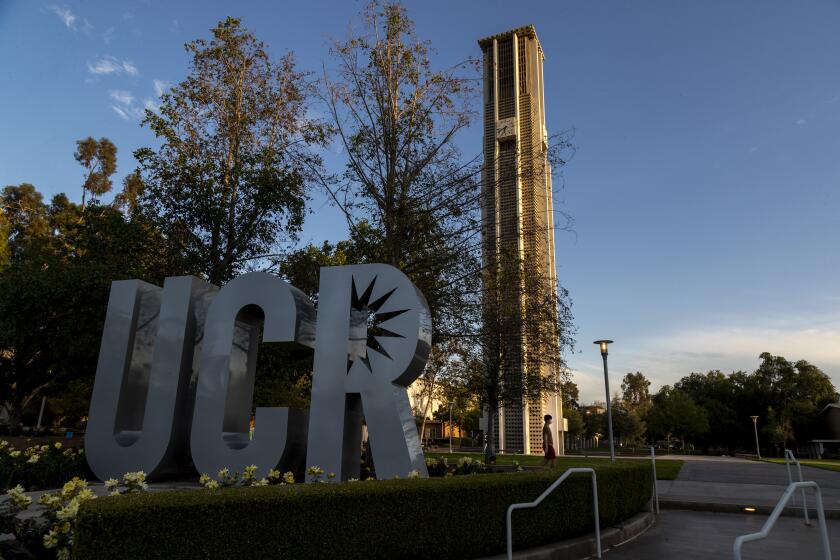Wildcat Strike Idles Cargo at L.A.-Area Ports : Commerce: Many drivers avoid docks as independent truckers continue their protest of higher fuel prices.
A wildcat strike by independent truckers Friday paralyzed a large portion of the freight traffic at Los Angeles-area ports and rail yards, delaying cargo delivery and disrupting the shipment of consumer and industrial goods nationwide.
For the second day in a row, many independent truckers, fearful of violence, refused to pick up or deliver shipments of containerized cargo, which makes up an important part of the region’s freight traffic.
There were no confirmed local reports of violence Friday, but a small number of protesters at the Port of Los Angeles were arrested for blocking traffic and disobeying officers’ orders, according to the Los Angeles Police Department.
Independent truckers launched a weeklong strike Thursday to protest, among other concerns, higher diesel fuel prices, which rose as much as 40 cents a gallon last month due to new federal fuel taxes and environmental regulations.
At the Ports of Los Angeles and Long Beach, which are the nation’s two busiest ports for handling containerized cargo, truck traffic was down dramatically.
“What we are seeing is a drastic reduction in the number of trucks at the harbor,” said Port of Long Beach spokeswoman Yvonne Avila, who estimated traffic was running 90% below normal. “Terminals that would have 100 trucks waiting at the gate have only six or seven.”
Since 40% of the containers moving through the port are headed east of the Rocky Mountains, any disruption to local port traffic “affects the entire nation,” Avila said. “It might mean that stores on the East Coast or Midwest will receive their goods late.”
Some containers, which can hold everything from cosmetics to industrial machinery, had begun to pile up on terminal storage yards and docks, and some import-export firms were having trouble moving goods out of their warehouses, Avila said.
Charlie Woo, co-owner of Mega Toys in downtown Los Angeles, a wholesale toy distributor that imports toys from Hong Kong, said he has been unable to receive any merchandise.
“The Christmas crunch is really on for us right now,” Woo said. “It’s frustrating to have your merchandise in the harbor and not be able to get to it. If it continues next week, we might have a significant loss in business.”
Independent truck drivers play a key role in moving 20- to 48-foot-long containers among trains, trucks and ships. At the Port of Los Angeles, giant cranes lift the containers off the decks of ships to the backs of trucks, which then deliver the containers to their final destination or to rail yards for transport by train.
This form of transportation has proven one of the most efficient ways to move cargo over long distances and has been a key factor in the growth at local ports, said Jack Kyser, chief economist at the Economic Development Corp. of Los Angeles County.
“Anything like this is going to further disrupt the whole transportation network,” Kyser said.
The Southern Pacific, Santa Fe and other railroads reported a substantial drop in container and trailer shipments at their Los Angeles-area rail yards.
“There is a scarcity of drivers (for) these trailers and containers,” said Mike Martin, spokesman for Santa Fe. “We are running trains into and out of Los Angeles, but the volume is substantially down.”
In other parts of the country, there were reports of sporadic violence, and truck traffic was below normal in some cities. Two Ohio truck drivers have been injured and nine others shot at since the start of the strike, the Ohio Highway Patrol said Friday.
Many large trucking firms and companies that own and operate their own trucking fleets were apparently not affected by the strike, according to trucking officials and executives.
Times staff writer Scott Sandell contributed to this report.
More to Read
Start your day right
Sign up for Essential California for news, features and recommendations from the L.A. Times and beyond in your inbox six days a week.
You may occasionally receive promotional content from the Los Angeles Times.





